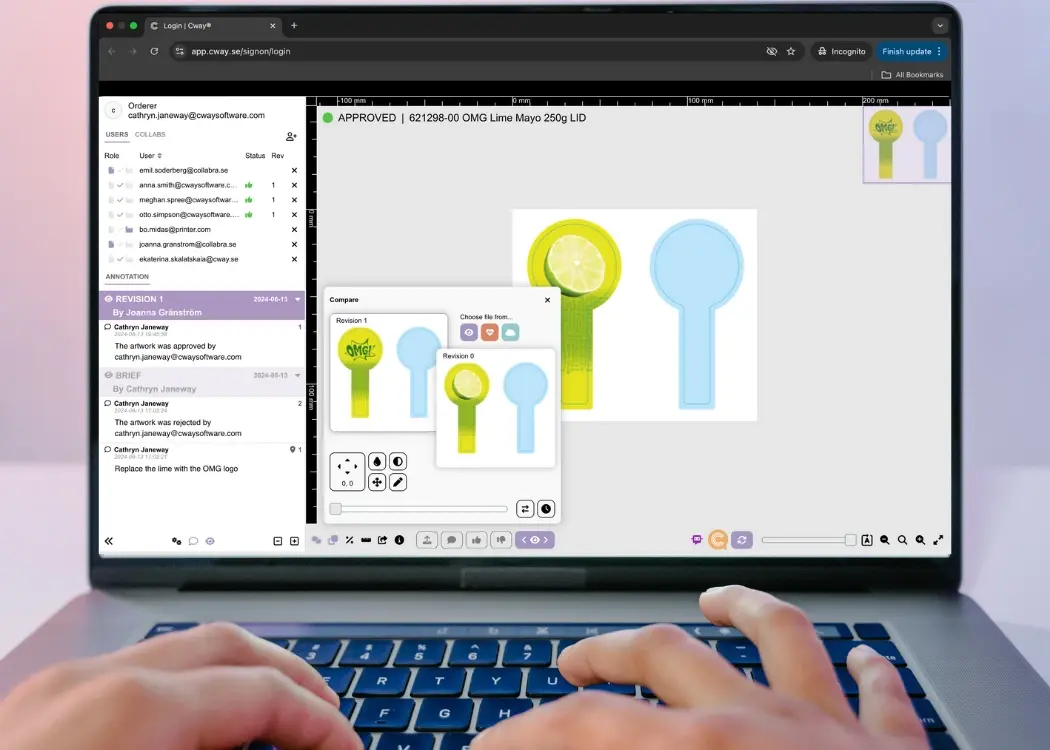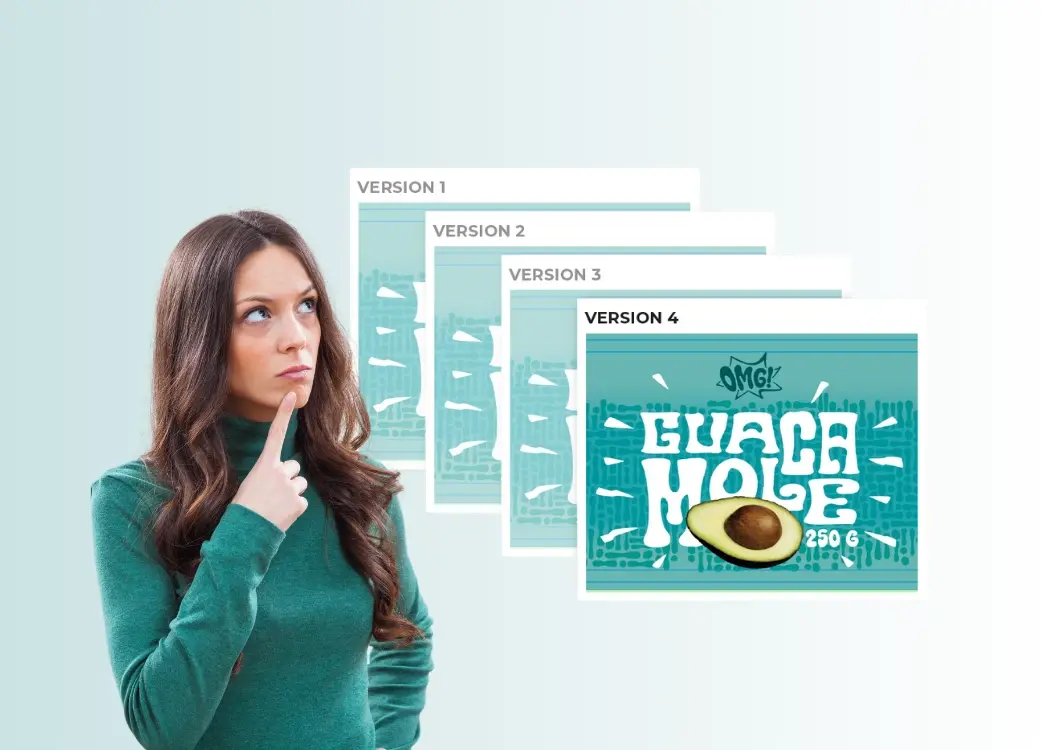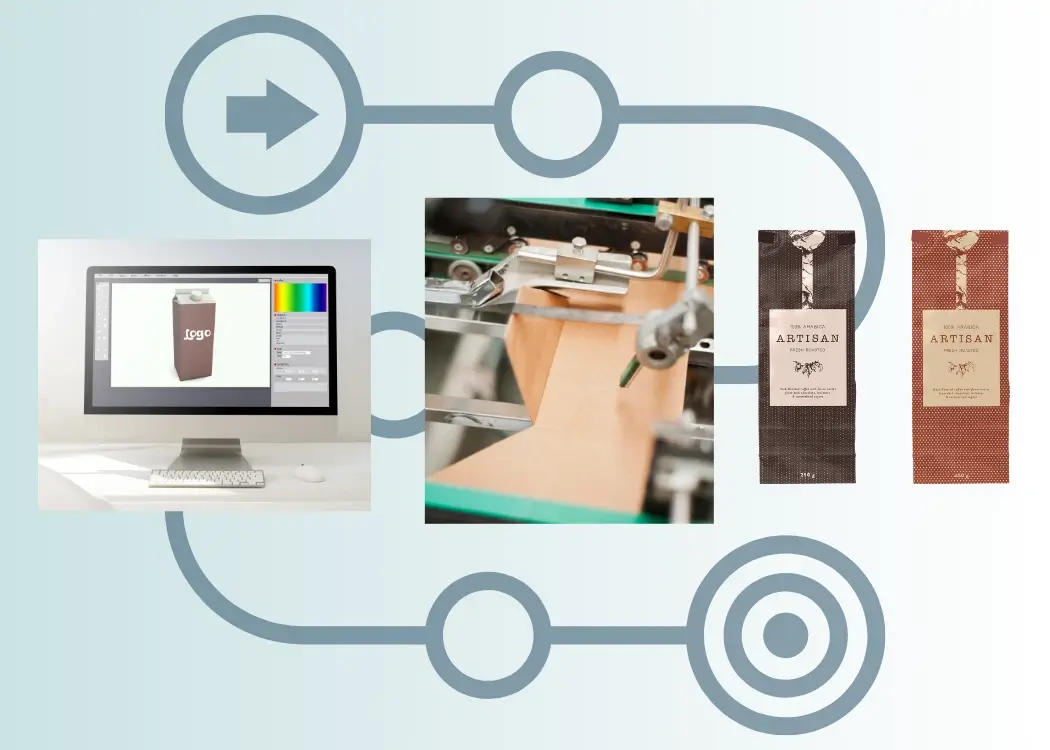Packaging design version control: best practices to stay on track
You’ve probably been there: 10 rounds of artwork edits, 4 people CC’d on a PDF, and a folder full of files named Final_v3_THIS_ONE_USE.pdf....
5 min read
Ekaterina Skalatskaia
:
May 29, 2025 7:15:00 AM

Ever tried approving packaging artwork by email? It's a game of "Which version are we on again?" followed by "Oops, that wasn’t the final one"—and suddenly you're printing 50,000 yogurt lids with the wrong ingredient list.
Welcome to the wild world of packaging artwork version control—where a simple missing accent or outdated GTIN can lead to costly errors, product recalls, or just a lot of awkward conversations.
Thankfully, there’s a smarter, faster way to handle this. In this article, we’ll walk you through why comparing artwork versions matters, where traditional comparison methods fall short, and how the Cway® Viewer changes the game with its powerful artwork comparation tools.
Packaging artwork isn’t just a design. It’s a collaboration between marketing, legal, compliance, supply chain, printers—and sometimes, their printers. The result? Dozens of revisions. Dozens of people. One fragile email thread to hold it all together.
Even with good intentions, teams run into the same challenges:
Reviewing the wrong version of a file
Losing track of feedback history
Manually flipping between static PDFs
Overlooking small but important changes
And when files are emailed around, uploaded to cloud folders, or renamed "Final_FINAL_v3.pdf"—let’s be honest—you’re basically flying blind.
Discover how leading brands streamline packaging artwork, approvals, and file management—all in one platform.
Reviewing changes side-by-side isn’t just a luxury—it’s mission-critical. Here’s why a real artwork comparation tool isn’t optional anymore:
Catch subtle mistakes: A barcode slightly resized, a misplaced label, or a missing allergen line can be easy to overlook if you’re just skimming.
Ensure compliance: Regulated products (like food, pharma, cosmetics) can’t afford “close enough.”
Give precise feedback: Reviewers can only be accurate when they can clearly see what’s changed.
Save time: No more downloading files, opening them in Photoshop, resizing windows, and squinting.
Reduce confusion: Everyone sees the same versions in the same context—with zero risk of mixing them up.
Explore our powerful packaging workflow tools—no strings attached. Start optimizing your artwork process today.
In most companies? It’s some version of this:
Open both PDFs in Acrobat
Try to align them manually
Flip between tabs while muttering
Guess what changed and hope you’re right
Some go a step further and overlay layers in Adobe Illustrator (if they have it). But not everyone’s a graphic designer—or wants to be one after 5 PM.
Cloud drives like Google Drive or Dropbox offer preview features, but they don’t support layered design files or custom packaging formats. And they certainly don’t include smart image comparison tools built for packaging workflows.
Fill out a quick form to request your account and start collaborating on packaging artwork with your team.

This is where Cway® comes in. More specifically, the Cway Viewer—our high-powered tool that lets teams view, compare, comment on, and approve packaging artwork files without ever needing external software.
You don’t need to install Illustrator. You don’t need to chase down links. And you definitely don’t need to download five “final” versions to figure out what changed.
Here’s what makes it so powerful.
Every design file is available inside the project or in the asset library. That means:
No sending files back and forth
No “who has the latest version?” panic
No version control nightmares
Everyone sees the same file, in the same Viewer, with a complete activity history.
The Cway Viewer keeps track of every version, every comment, and every approval in one place. You can:
Scroll through the full revision history
See who approved what and when
Go back to any earlier version if needed
That’s a true artwork version control tool—designed for packaging, not just generic doc editing.
This is where Cway really shines. The Viewer lets you compare any two artwork versions—and not just revisions within a project.
You can:
Compare the current version with any previous revision
Compare a file from Project A with a file from Project B
Compare a project file with any asset in the Media Center library
It’s not just “compare version 2 with version 3”—it’s compare anything with anything.
The Viewer comes packed with smart image comparison features tailored for image comparation software:
Blink mode: Files alternate rapidly to reveal even subtle visual differences
Transparency control: Overlay one version on top of the other with adjustable opacity
Contrast mode: Highlight differences by boosting contrast between layers
Shift and align: Move files pixel-by-pixel to align misaligned designs
Swap mode: Flip version A and version B with one click to compare in both directions
You don’t have to guess anymore. You see the differences—clearly, instantly.
Here’s the real game-changer: all this comparison magic happens inside the Cway Viewer.
Why is that so important?
No more external tools. Designers, marketers, and regulatory can all review the same files, even if they don’t have creative software.
Speed. You’re not jumping between programs or tabs—you’re doing everything in one place.
Accuracy. The feedback you leave is based on the exact same visual reference everyone else is using.
Control. Every comparison, comment, and decision is logged in the project history. Nothing gets lost.
Your artwork is too important to be judged by guesswork or split-screen Acrobat comparisons. You deserve a real tool built for real packaging work.
Cway® gives you the tools to compare artwork versions like a pro:
Smarter workflows
Better visibility
No surprises at print time
Before you go, if comparing artwork is just one part of your packaging workflow challenges, we’ve got more resources to help you stay in control.
If your team juggles multiple revisions, deadlines, and stakeholders, you’ll find our article on tracking packaging artwork tasks especially useful. It offers practical tips for keeping every step of the approval process visible and on schedule.
For those managing multiple product launches or cross-functional teams, don’t miss our deep dive into how to manage packaging design projects. It’s packed with advice on setting up workflows, defining roles, and making sure nothing slips through the cracks.
And if you're ready to go beyond managing and start optimizing, take a look at Cway Pulse—our powerful workflow analytics dashboard. It gives you real-time visibility into how your team is performing and where you can improve efficiency.
Together, these guides can help you build a smarter, faster, and more controlled packaging process—from first draft to final print.
Comparing artwork versions helps you spot even the smallest changes between revisions—like layout shifts, barcode updates, or ingredient label edits. It ensures everyone on the team is reviewing the right version and prevents costly production errors caused by outdated or incorrect files.
An artwork version control tool tracks every revision of a packaging file, along with comments, approvals, and changes. It helps teams stay aligned, prevents version confusion, and ensures that only the latest, approved design is used for printing or distribution.
Traditionally, teams compare files manually using PDFs or design software. But with a solution like the Cway® Viewer, you can instantly compare any two artwork files—using features like blinking mode, transparency control, contrast highlighting, and side-by-side viewing, all in your browser.
The Cway® Viewer supports a wide range of file formats including layered design files (e.g., Adobe Illustrator), PDFs, and raster images. It allows users to review, comment on, and compare files without needing special design software installed.

You’ve probably been there: 10 rounds of artwork edits, 4 people CC’d on a PDF, and a folder full of files named Final_v3_THIS_ONE_USE.pdf....

If your team struggles to manage packaging artwork across multiple stakeholders, you’re not alone. In this article, we’ll explore how artwork...

Your Guide to the Artwork Workflow Behind Great Packaging When you pick up a product in a store — from a yogurt cup in Colombia to a shampoo bottle...